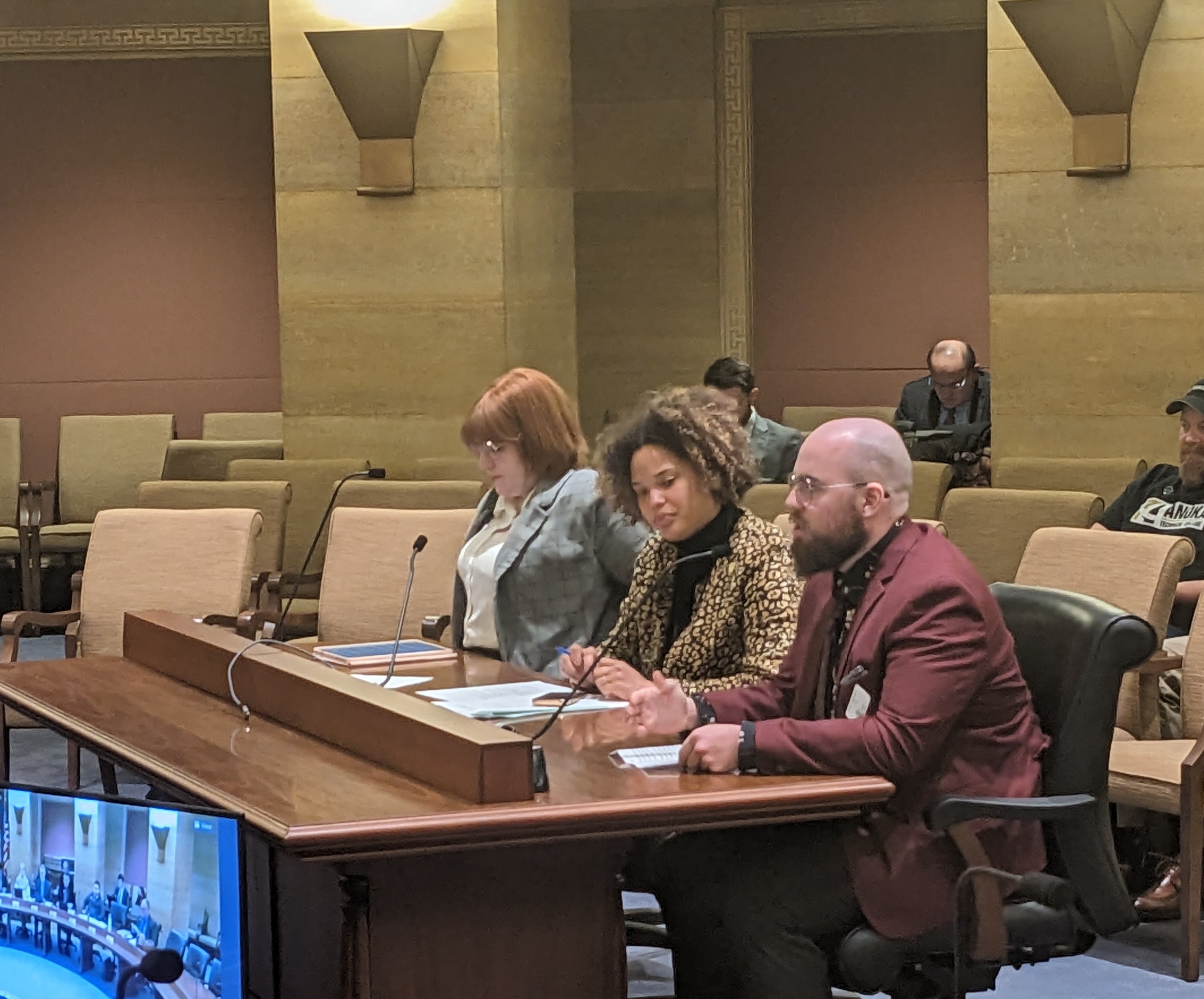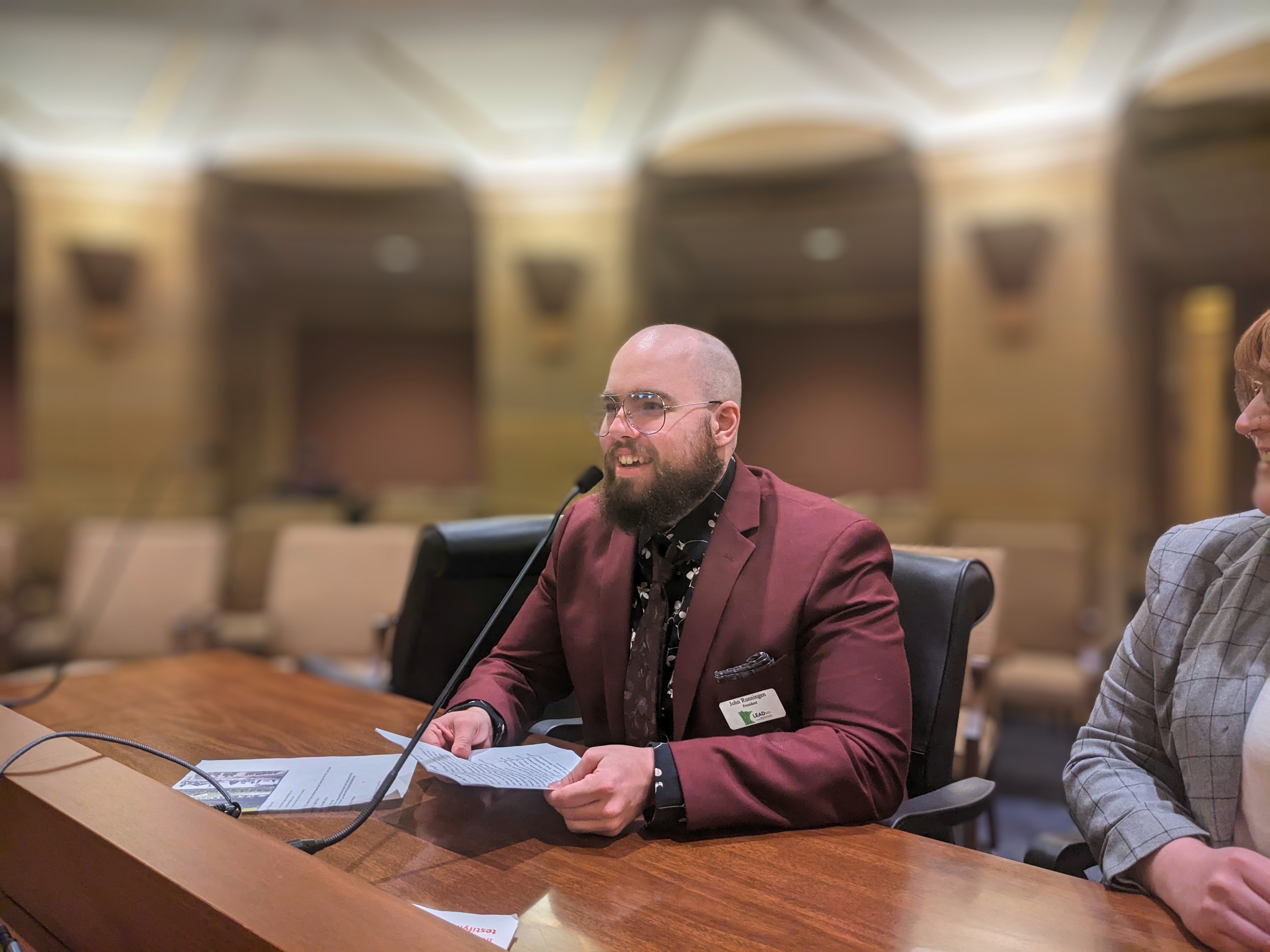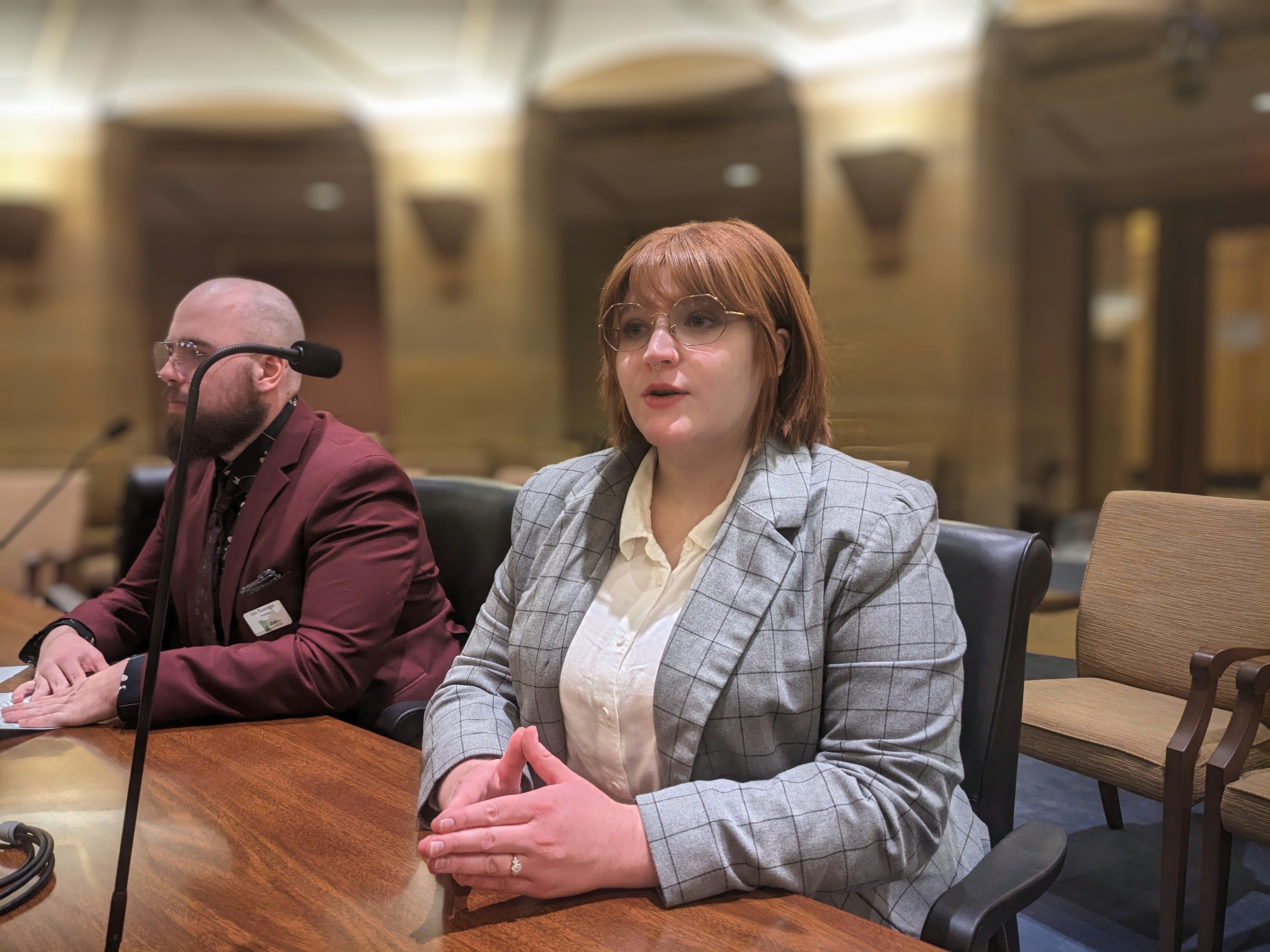
Henri Mingo, Sen. Oumou Verbeten, and John Runningen speaking to the Senate Higher Education committee.
The Minnesota Senate Higher Education Committee approved legislation today to expand the state emergency grant program with $15 million in funding to support students in need. Sen Oumou Verbeten, the lead author of SF 431, told committee members that, "emergency grants not only keep students afloat, they help the health of our institutions."
Sen Oumou Verbeten was joined by LeadMN President John Runningen and Public Relations Coordinator Henri Mingo in testifying in support of this critical legislation. You can watch their testimony below.
 Testimony of John Runningen, LeadMN President
Testimony of John Runningen, LeadMN President
Chair Fatteh, vice chair Putnam, ranking minority member Duckworth and members of the committee, for the record, my name is John Runningen, and I am the president of the statewide student association for community and technical colleges, LeadMN.
I am here today to speak in favor of Senate File 431, which is legislation that will provide emergency grants to students in need. First, I want to thank Senator Oumou Verbeten for bringing forward this impactful piece of legislation that will provide critical support to students in need. Temporary setbacks can place low-income students in vulnerable positions and threaten their college careers and success. These complications aren’t covered by typical financial aid, which many students rely on to make college affordable and accessible. These setbacks include but aren’t limited to extra living expenses such as rent, utility bills, car repairs, healthcare, or childcare.
Emergency grants provide a lifeline to students like me, but these programs were rare before the pandemic. The COVID relief money to higher education institutions was critical in helping so many students stay in school that faced job losses, medical expenses, and other unforeseen costs during the pandemic. Now that the pandemic is over, the need for these programs did not go away. This legislation is a great tool to give colleges and universities across Minnesota the ability to help vulnerable students complete their degrees.
In fact, a number of states had emergency grant programs before the pandemic - from New York to Wisconsin to even here in Minnesota. A study in New York found that of the students receiving emergency grants, 94% were still enrolled in college, or had successfully graduated or completed their program of study, in the semester immediately following receipt of their award. That represents an eighteen-point increase in retention rates for the New York campuses.
Part of the success of this program is not just the grant itself; the process also increased students’ awareness of the broader range of support available to them on campus and in the surrounding community. Eight in 10 recipients noted that applying for the grant caused them to learn about other resources that they didn’t know about beforehand.
This type of program is so beneficial that LeadMN launched our own emergency grant program to fill the need at community and technical colleges across the state. Since 2020, LeadMN has distributed over $40,000 in $100 to $200 increments to help students out.
One recipient shared - “I AM 33 WEEKS PREGNANT AND AM HIGH RISK AND UNABLE TO WORK. I AM UNABLE TO WORK DUE TO HAVING RECENTLY HAD COVID WHILE PREGNANT, AND MY BABY IS NOT GROWING AS SHE SHOULD BE. I ALSO HAVE A SIXTEEN-YEAR-OLD SON, SIXTEEN-MONTH-OLD CHILD, AND HUSBAND. MONEY IS TIGHT ALL AROUND AND WE HAVE TO BUDGET TO COVER JUST OUR LIVING EXPENSES. WE GREATLY APPRECIATE THE ASSISTANCE AVAILABLE.
Another student shared, “WHEN MY HOURS WERE CUT, I STRUGGLED TO PAY THE BASIC NECESSITIES/BILLS LIKE THE ELECTRIC AND PHONE BILL. RIGHT NOW, MY BROTHER RELIES ON ME TO BUY GROCERIES AND KEEP THE ELECTRIC/ HEAT ON. I’VE HAD TO ALLOCATE MONEY TO PAY FOR BILLS BEFORE I CAN BUY GROCERIES. I GO FOR A WEEK OR TWO WITHOUT ENOUGH FOOD ESPECIALLY ON THE DAYS I’M NEAR DUE BILLS.”
The amount of money is small, but the impact is huge for each of these students. Minnesota, for years, has had a relatively small emergency grant program. This legislation will allow colleges and universities to scale up a proven program that will help boost retention and help more students obtain their degree.
I now would like to pass it over to Henri Mingo to share her story on the impact of emergency grants.
 Testimony of Henri MIngo, LeadMN Public Relations Coordinator
Testimony of Henri MIngo, LeadMN Public Relations Coordinator
Chair Fatteh, vice chair Putnam, ranking minority member Duckworth and members of the committee, for the record my name is Henri Mingo and I am a student at Minneapolis College studying graphic design.
Like so many other community and technical college students, I struggle to afford college. I don’t come from a wealthy family and work hard both inside the classroom and multiple jobs to barely make ends meet.
Last spring I was sitting at home with my fiance when we got the text that someone we had recently seen tested positive for COVID. We waited the next few days hoping for the best, but very quickly we both became extremely ill, nearly hospitalized.
This put us out of work for over two weeks, and into an impossible financial situation. We weren’t sure how we would cover food for the next few weeks, let alone rent and the medical bills associated with having severe COVID.
The situation was dire for me as a full time student, and it seemed I would have to take on additional debt or drop classes to be able to survive this financial hit.
Instead, I applied to my campuses emergency grant program. This was not the first time that I needed an emergency grant. Earlier in the year I faced a situation where I needed an emergency grant to cover housing, but it took a long time to pull together the documentation needed to apply for the grant to prove that I was unhoused due to covid. And by the time I pulled the documents together, the money for my campuses emergency grant program had run out for the semester. I found myself in significant financial debt trying to stay afloat.
Luckily the second time I needed the grant, my college still had money available. That grant of $2000 helped us pay the bills while we were sick with COVID. Today I am still pursuing my college education, and will be graduating this spring thanks to my campus's emergency grant program.
I am so grateful that the federal COVID relief funds were earmarked for students facing emergencies. But now that the money has been spent, this legislation will continue a program that has proven to be effective at helping students continue on in college. I urge this committee to pass this critical legislation to support Minnesota students that face a bump in the road of their educational journey.